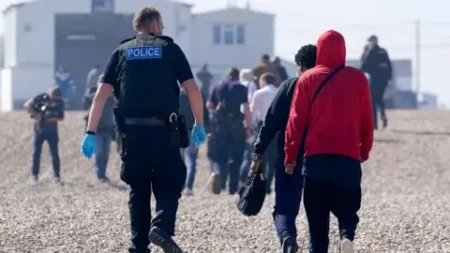Angela Rayner, the Deputy Prime Minister of the United Kingdom, has raised concerns about the factors undermining social cohesion within the nation. In a recent presentation, she emphasized the significant impacts of deprivation, rising internet usage, and immigration on the communities across the UK. Rayner’s comments come in the context of a year-long study commissioned following the violent riots ignited by tragic events, specifically the murders of three young girls in Southport.
The Deputy Prime Minister outlined how these elements contribute to eroded trust between people and institutions, which is vital for fostering a harmonious society. She stressed the importance for government officials to address the genuine concerns of citizens to begin rebuilding that trust. Rayner’s insights coincide with her announcement that the unpublished study would form the core of the forthcoming Plan for Neighbourhoods. This plan includes a substantial financial commitment, with an investment of £1.5 billion aimed specifically at 75 of the “most deprived” areas throughout the UK over the next decade.
As the nation approaches the anniversary of the Southport attack, which occurred on July 29, Rayner’s comments carry weight. She underscored that the violence following the murders—where Axel Rudakubana perpetrated a brutal assault during a Taylor Swift-themed dance class—was not just an isolated incident, but rather a symptom of deeper societal issues. In addition to the tragic loss of life, the attacks left several others injured, including bystanders attempting to intervene. The chaos and tragedy that ensued from this event led to widespread riots across the country, with reports indicating over 600 arrests.
Prime Minister Sir Keir Starmer characterized these riots as a manifestation of “far-right thuggery,” as various groups targeted mosques and accommodations for asylum seekers, exacerbating divisions. In a meeting with colleagues, Rayner highlighted that 17 out of the 18 areas that were hardest hit by protests were some of the most economically disadvantaged in the UK. Her invocation of the need for government intervention reflects her belief in the necessity of addressing these systemic issues if Britain is to retain its identity as a successful multi-ethnic and multi-faith society.
The Cabinet meeting provided a platform for Rayner to articulate the urgency of recognizing how economic insecurity, immigration dynamics, and digital isolation affect public trust and community cohesion. She urged government officials to take responsibility for addressing and mitigating the real concerns of the populace, aiming to provide opportunities that allow all citizens to thrive.
In light of these events, the government has begun to unveil steps aimed at increasing public safety, particularly in response to threats of mass violence akin to those seen in the Southport tragedy. Home Secretary Yvette Cooper has announced plans for more stringent sentences for individuals preparing to engage in mass killings, underlining a commitment to developing new legal tools to manage violence-obsessed individuals, regardless of their ideological motivations.
Moreover, recent events have demonstrated ongoing tension related to immigration and asylum-seeking, with protests surfacing outside facilities housing migrants. One such demonstration in Essex saw over a thousand individuals gather in opposition, resulting in clashes with police. Encouragingly, the government has deemed such unrest as unacceptable, signifying a recognition of the need for effective dialogue and action to prevent communities from splintering further.
Angela Rayner’s comprehensive perspective showcases a moment of critical reflection for the UK, motivating leaders to adopt a pledge of accountability and action in preserving social stability. The issues she has highlighted stand as call-to-action elements for policymakers moving forward, beckoning a plan of revitalization and restoration to help mend communities that have long suffered from a lack of resources and social connectivity. As the UK navigates these turbulent waters, the burden to foster an inclusive society remains an enduring challenge for its leadership and constituents alike.









